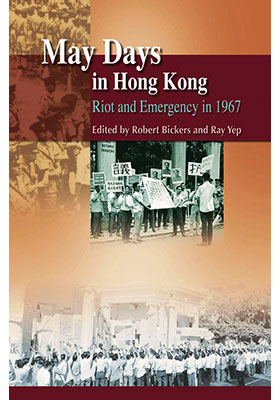May Days in Hong Kong
Riot and Emergency in 1967
(香港的五月:1967年暴動和事變)
ISBN : 978-962-209-082-8
August 2009
232 pages, 6″ x 9″
Ebooks
In this study of the anti-colonial riots which erupted in Hong Kong in May 1967, the authors of May Days in Hong Kong shed new light on their causes, their impact on future government policy and on Sino-British relations, and their legacy for Hong Kong society and governance, and the people of the territory.
This is the first sustained exploration of the anti-colonial campaign that was inspired by the Cultural Revolution in China, recent events in Macao, and fuelled by inequalities in Hong Kong society. The riots presented a sustained challenge to British authority. As leftist-led demonstrations evolved into a terrorist bombing campaign, the British security response was also markedly strengthened. Using recently opened archival records, the authors explore the course of the events, their international and imperial contexts, and their connection to the upheaval in China, and Britain’s own changing world role. The events of 1967 are also grounded in the wider sweep of Hong Kong’s history.
The second part of the book presents testimonies from Hong Kong residents, participants in different ways in the unfolding events, which speak to the salience of 1967 in Hong Kong’s popular memory. There has been an awkward silence about this episode for almost forty years, and this book begins to normalize discussion about it, and its place in Hong Kong, Chinese and British imperial history.
The readership will include scholars and students studying Hong Kong, Chinese and British imperial history and politics, as well as a popular readership interested in Hong Kong history, society and politics.
“This is the first major scholarly study of the crisis that engulfed British-ruled Hong Kong in 1967. It will be essential reading for those concerned with Hong Kong’s tortuous passage to 1997, and invaluable to the wider understanding of Britain’s end of empire—to which the precarious survival of Hong Kong as a colony appeared such a spectacular exception.” —John Darwin, Nuffield College, University of Oxford
“This outstanding book is a major contribution to our understanding of modern Hong Kong. It recounts the story of how the political and social culture was radically changed by the anti-colonial upsurge of 1967, even though the community rejected the Maoist turmoil that swept the rest of China during the Cultural Revolution. The individual essays are a pleasure to read: original and often exciting, they set new standards for Hong Kong’s historians.” —Leo F. Goodstadt, author of Uneasy Partners: The Conflict Between Public Interest and Private Profit in Hong Kong and Profits, Politics and Panics: Hong Kong’s Banks and the Making of a Miracle Economy, 1935–1985


